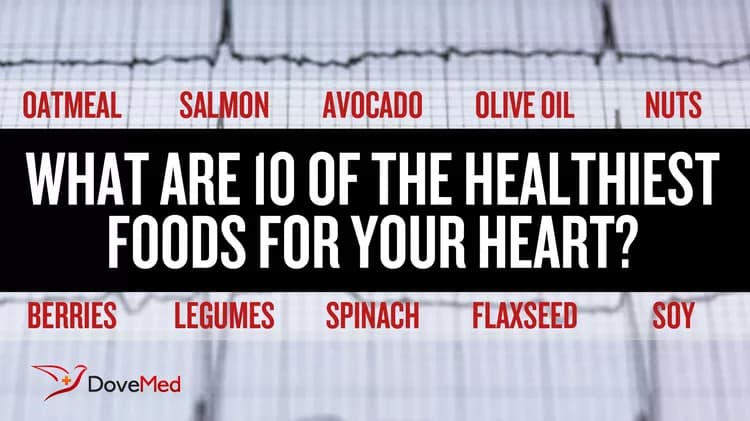
What Are 10 Of The Healthiest Foods For Your Heart?
Monounsaturated fats and polyunsaturated fats are known to be great for the heart because of their role in lowering low-density lipoprotein (LDL) cholesterol levels and raising high-density lipoprotein (HDL) cholesterol levels. Including foods containing these fats in one’s diet ensures that one’s heart stays protected.
Here are 10 of the healthiest foods for the heart:
- Oatmeal: Research published in Nutrition Clinical Care in 1998 showed that individuals who ate whole grain oat cereal showed a 3.8% reduction in total cholesterol levels and a 4.2% reduction in LDL cholesterol levels. Oatmeal is a rich and healthy food that contains omega-3-fatty acids, folate, and potassium.
- Salmon: Consuming 2 servings of salmon every week has shown to reduce the risk of dying from a heart attack by up to one-third. Salmon contains omega-3-fatty acids and the carotenoid astaxanthin, which has antioxidant properties.
- Avocado: According to research published in 2013 in the Nutrition Journal, avocado consumption is associated with overall improved diet quality and nutrition intake. Avocados contain monounsaturated fatty acids, essential nutrients, dietary fiber, and phytochemicals.
- Olive oil: A review published in Alternative Medicine Review, a journal of clinical therapeutic value, reports that olive oil has been widely studied for its effects on coronary heart disease, especially its property of reducing blood pressure and low-density lipoprotein (LDL) cholesterol.
- Nuts: Almonds, macadamia nuts, and walnuts contain omega-3-fatty acids, fiber, and antioxidants. A research article published in the British Journal of Nutrition in 2006 reported that deaths due to cardiovascular and coronary heart diseases showed strong and consistent reductions with increasing nut consumption.
- Berries: Strawberries, raspberries, and blueberries contain anti-inflammatory compounds that reduce the risk of heart disease.
- Legumes: Chickpeas, lentils, and kidney beans are all rich sources of omega-3-fatty acids, calcium, and soluble fiber.
- Spinach: This green vegetable contains substantial amounts of lutein, potassium, fiber, and folate, which can help keep the heart in good shape.
- Flaxseed: Sprinkling some flaxseed over a bowl of oatmeal ensures that one receives omega-3 and omega-6 fatty acids. Research study published in Applied Physiology, Nutrition, and Metabolism in 2009 shows that dietary fiber in flax seed provides a hypocholesterolemic action. The omega-3 content provides anti-atherogenic effects. Dietary flaxseed also protects against ischemic heart disease.
- Soy: The ability of soy isoflavones to reduce plasma cholesterol levels may be still under review (Sirtori et. al., Drug Safety, 2001), but it is a good source of lean protein for one’s diet. Soymilk can be enjoyed with a bowl of oatmeal.
When planning meals for the week, it is a good idea to include most of these food items. They are readily available in the market and are good for your heart health.
References:
Johnston, L., Reynolds, H. R., Patz, M., Hunninghake, D. B., Schultz, K., & Westereng, B. (1998). Cholesterol-lowering benefits of a whole grain oat ready-to-eat cereal. Nutr Clin Care, 1, 6-12.
III, V. L. F., Dreher, M., & Davenport, A. J. (2013). Avocado consumption is associated with better diet quality and nutrient intake, and lower metabolic syndrome risk in US adults: results from the National Health and Nutrition Examination Survey (NHANES) 2001-2008.
Waterman, E., & Lockwood, B. (2007). Active components and clinical applications of olive oil. Alternative medicine review: a journal of clinical therapeutic, 12(4), 331-342.
Blomhoff, R., Carlsen, M. H., Andersen, L. F., & Jacobs, D. R. (2006). Health benefits of nuts: potential role of antioxidants. British Journal of Nutrition,96(S2), S52-S60.
Beattie, J., Crozier, A., & Duthie, G. G. (2005). Potential health benefits of berries. Current Nutrition & Food Science, 1(1), 71-86.
Bassett, C. M., Rodriguez-Leyva, D., & Pierce, G. N. (2009). Experimental and clinical research findings on the cardiovascular benefits of consuming flaxseed.Applied Physiology, Nutrition, and Metabolism, 34(5), 965-974.
Sirtori, C. R. (2001). Risks and benefits of soy phytoestrogens in cardiovascular diseases, cancer, climacteric symptoms and osteoporosis. Drug Safety, 24(9), 665-682.
Helpful Peer-Reviewed Medical Articles:
Anand, S. S., Hawkes, C., De Souza, R. J., Mente, A., Dehghan, M., Nugent, R., ... & Kromhout, D. (2015). Food consumption and its impact on cardiovascular disease: importance of solutions focused on the globalized food system: a report from the workshop convened by the World Heart Federation. Journal of the American College of Cardiology, 66(14), 1590-1614.
Stewart, R. A., Wallentin, L., Benatar, J., Danchin, N., Hagström, E., Held, C., ... & Vedin, O. (2016). Dietary patterns and the risk of major adverse cardiovascular events in a global study of high-risk patients with stable coronary heart disease. European heart journal, 37(25), 1993-2001.
Sacks, F. M., Lichtenstein, A. H., Wu, J. H., Appel, L. J., Creager, M. A., Kris-Etherton, P. M., ... & Stone, N. J. (2017). Dietary fats and cardiovascular disease: A presidential advisory from the American Heart Association. Circulation, 136(3), e1-e23.
Planck, N. (2016). Real food: What to eat and why. Bloomsbury Publishing USA.
Related Articles
Test Your Knowledge
Asked by users
Related Centers
Related Specialties
Related Physicians
Related Procedures
Related Resources
Join DoveHubs
and connect with fellow professionals

0 Comments
Please log in to post a comment.